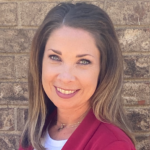At Enhabit Home Health & Hospice, the clinical excellence team focuses on ensuring patients receive the highest quality of care. One way they do that is through quality and outcome specialists.
In this position, employees work with branches across the state they are located in. There, they educate staff on how to use Enhabit’s resources to accurately score OASIS. OASIS is a tool for Medicare-certified home health agencies to track and report on patient outcomes.
Quality and outcomes specialists can come from different backgrounds in the health care field. Enhabit employee Keri’s career in health care started after she graduated from nursing school. She first worked in a hospital and then moved into home health, where she has stayed ever since, enjoying various roles.

“I fell in love with it immediately,” she said. “I fell in love with being able to go into the patient’s environment and help them get better. When you go into their home, you see what they need, or what they have, and how you can make them safe in their environment.”

A great part about working at Enhabit is the fact that employees can enjoy multiple career opportunities. While Keri started as a branch director and moved into a quality and outcomes specialist role, she now is a director of operations at Enhabit.
Other employees, like Molly, came to Enhabit as a clinician working directly with patients in their homes. Though she started as a physical therapist teaching patients how to take control of their own health, she still considers herself an educator.
“I have always seen myself as an educator,” she said. “Even as a quality and outcomes specialist, I still consider myself very much to be an educator. But in this role, I’ve learned I love analysis and data-driven solutions.”
Being a quality and outcomes specialist is all about listening
Although days are guaranteed to be different as a quality and outcomes specialist, Molly’s goals are to support the four pillars of quality. These pillars are: reduce hospitalizations, improve outcomes, uplift the patient experience and elevate the quality of clinical documentation.
Her role encompasses a large span of branches and patients. But she sums it up to be mostly about lending an ear and collaborating.
“Mostly, my job is about listening,” she said. “I am really good at identifying problems, but when it comes to solutions, the people closest to it are the ones that will come up with the best strategies. This is why we have regular quarterly meetings where clinicians from all disciplines are invited to the help identify areas to improve and develop strategies to get us there.”
When quality and clinical teams work together, Molly says she feels inspired and happy to be a part of a helping team.
“My favorite part of my job is interaction with people from all over the company, especially clinical staff,” she said. “I love helping answer questions and listening to their thoughtful insights of what is happening in patient homes.”
But most importantly, when there is direct collaboration between teams with the goal of outcomes and experience in mind, patients benefit. And from Keri’s perspective, Enhabit’s focus on quality patient education has made a huge difference in patient satisfaction and outcomes.
She thinks making education a priority is something that sets the company apart. Materials provided during Enhabit home visits are disease-specific and printed in simple language that uses bigger fonts to make them easier to read and more accessible to a wide variety of patients.
Quality is patient care
Coming back to those four pillars of quality, Molly says that paying attention to hospitalizations, outcomes, patient experience and documentation is what makes up patient care as a whole.
“Quality is patient care,” she said. “Keeping patients safe in their homes, improving their ability to function, ensuring a positive experience and having good communication is the essence of quality care.”
And these goals aren’t achieved without collaboration or synergy amongst clinical and quality teams.
“When our clinical staff is engaged and understand that quality initiatives are at the heart of patient care, and that their individual contributions have positive impact not only on the lives of their patients but on the culture, quality and reputation of the entire company, magic happens!” she said.
Having a bigger impact
In Keri’s positions, she’s been able to see the impact Enhabit is making – both on an individual and larger level.
“What’s unique to me about Enhabit is when they identify anything that a patient or a community might need, they don’t stop there,” she added. “What I’ve really seen is how involved they are with the community — with the hospitals and with the referral sources — collaborating with them to get patients better. It’s truly ‘What can we do for this patient and this community?’”
For Keri, working at Enhabit has brought enjoyment back to her nursing career. It has also given her hope about the future of health care.
“It’s really made me feel like I can make a difference with patients. And it really makes me enjoy my job,” she said.
And for Molly, working at Enhabit has taught her the importance of having a team unified to ensure quality patient care.
“Achieving our quality initiatives is a team effort and not done in a vacuum,” she said. “Everyone plays a part in ensuring each patient receives the level of care they want and deserve.”
 Back to Resource library
Back to Resource library
Browse top categories
Social Share
At Enhabit our patients are our number one priority. From providing the latest medical practices to building deep personal connections, we’re focused on upholding every patient’s dignity, humanity and sense of control on their health care journey.
Home health
Our home health services give patients access to the care they deserve in the comfort of their own homes. From disease and injury management to recovery from surgery, our clinicians help patients confidently achieve their health care goals.
Hospice care
Our hospice care services place importance on the comfort of every patient living with a terminal illness. Our caring professionals are dedicated to providing not just physical care, but spiritual and emotional support to every patient and their loved ones.






